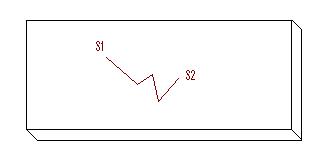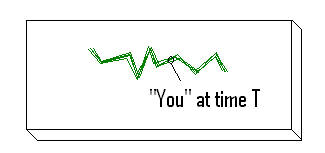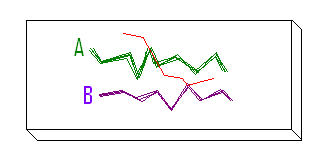The Block Universe Explained
I have already expressed my compatibilist position in other places, but I have never been able to fully synthesize it until I discovered the concept of the block universe. This concept really permits us to shed light on the concepts of free will, determinism, freedom, choice, which has hitherto not been possible. I will endeavour to explain this model as simply as I can for you. I'm going to take this slowly, so feel free to skip ahead if you're bored.
Imagine a translucent block in four dimensions. This is the universe. Okay, now this is a little problem, as it is very arduous to imagine four spatial dimensions, but just imagine it in three dimensions. Your length is time, and your slices are the universe at a specific time T (once again, remembering that our 2D slice is in reality a 3D volume- the volume of the universe). The block is not actually rectangular, but let's assume it is for the sake of simplification. So you can take a slice at time t=1, 2, 3... all the way to the last moment of the universe, and see their precise state (whether such states are actually knowable or not is outside of the purview of this discussion).

Now imagine an electron- any electron. This electron begins to exist at a certain time, and ends at a certain time. It could have been there since the beginning, or come into being by pair creation, and could be annihilated by a positron at some future time. So let's say this electron starts to exist at a certain slice of time S1 and ceases to exist at a certain slice of time S2. This electron, therefore, exists in all slices between S1 and S2. Connect the location of the electron in each slice and you get a line. This line we call a path in spacetime.

A basic principle is that paths in spacetime cannot move. That path, of the electron, does not change. It is fixed in the block universe because its movement, and its very existence, is determined by causality. If the electron hits a positron, it WILL dissapear, with no exceptions. But causality is a higher-level concept than the block universe- in the block universe, there are only paths. I will get to higher-level thinking relative to this in a minute.
To you, the electron is in movement because you navigate these slices of time at the same time as the electron. You can't possibly "see" the block universe for real. It's a purely theoretical construct so we can imagine what the universe is like, and a help to understanding.
Now, you are a gigantic blob composed of millions and millions of particles. I hope this does not come as a surprise to you. Your bunch of paths in spacetime would look a little bit like this:

As a human being, a higher-level organism, you can only be seen as a relational property of individual paths, just like you can only biologically be seen as a group of cells. Now two things are true about your bunch of paths, or that of most human beings. Your paths interact with each other in complex ways, and the bunch as a whole acts in many different ways.
This differs from, say, a rock. A rock may have more particles than you do, but:
1. Its particles don't interact in complex ways. Particles in your brain, at a certain level of organization, form neurons and brain modules. Particles in other areas form muscles and organs. The rock's particles are basically undifferentiated and don't really interact in any way. This inner complexity gives rise to what we call the will.
2. The rock itself does not act in many different ways. If you throw a rock down a cliff, it will do one thing and one thing only: fall. If you throw a human being off a cliff, it could do many different things: scream, flap his arms, roll in a ball, try to grab onto something, or just fall. This is what we call freedom.
Do you see where the free will part comes in now? We are free because, unlike a rock, we do many different things given the same context. And we have a will because our decisions are the product of an internal process guided by the complexity of our minds. Free will is not an illusion: it is a fact that comes about because of our complexity.
Let's take another example. Person A and person B reacted very differently when coming into contact with a penny (represented by the red path).

Person A, when in contact with the penny, kept it for a long time- probably in his pocket. Then it was eventually passed on to person B, who only kept contact with it for an instant. We can imagine that person B works at a bank, for example. The point I'm making here is that different people, or the same person in a different circumstance, will have different reactions in the same context.
We can extend the analogy by supposing that you put people in locked rooms having the exact same appearance. These people will no doubt have very different reactions to this state of affairs. This can only be explained, from the block universe perspective, by internal complexity.
You might say that this freedom is an illusion, due to the fact that the internal complexity of the human being is also determined. This is an error however, as we are talking about the freedom of the organism itself, not of its neurons or of the electrons that are in those neurons. The organism, taken as a whole, manifests freedom, within obvious physical limits (a human being, for example, cannot grow wings and fly). That is all that we mean when we say that "I have free will".

From this perspective, we can also begin to answer the question: what is sentience? Sentience is a specific kind of internal complexity that permits an organism to understand complexity in other things. Give a computer to a monkey, and he won't understand what it does. He'll just pound on it. Now of course there is a problem of language, but language itself is a form of complexity, albeit of a different kind. Even with language, there are some people who can't figure out how to use a computer very well. When an average person grapple with a computer, on the other hand, the complexity of his mind permits him to understand the complexity of using a computer.





Post a Comment
9 Comments:
Good work. That helps me understand the block universe and free will much more. Thanx!
No problem. I'm glad I was introduced to this notion because it really clarifies everything.
Actually, Franc is now a Time Sphericalist, 2nd class. ;)
Glove:
zach at drzach dot net
Nice - it's like a more technical version of what Robert Heinlein describes in his story "Life-Line".
OK, I believe this is the rationale behind the six years of LOST.
Aloha, Richard
This comment has been removed by the author.
You say, "We are free because, unlike a rock, we do many different things given the same context."
I suppose you don't take the context to be the complete state of the universe.
If that was the context, it wouldn't be obvious that we do many different things in the same context. At any rate, for it to be true would require there to be many possible universes where the action differs but where the universe was qualitatively identical up until the time of the action.
You messed up "block universe theory" a little here as soon as you brought "free will" into play. The whole concept of a block universe involves predetermination, that things that "will have" happened, "already have" happened in the future. Free will and choice, in this theory, don't exist.
Arguably your past determines your future anyway; someone who's fallen before should react differently than someone who hasn't. At the bare minimum, your max reaction time, weight, and other physical attributes affect the outcomes.
I don't believe block universe theory, personally. Like any good physics concept, it's utterly unprovable/unfalsifiable.
<< Home